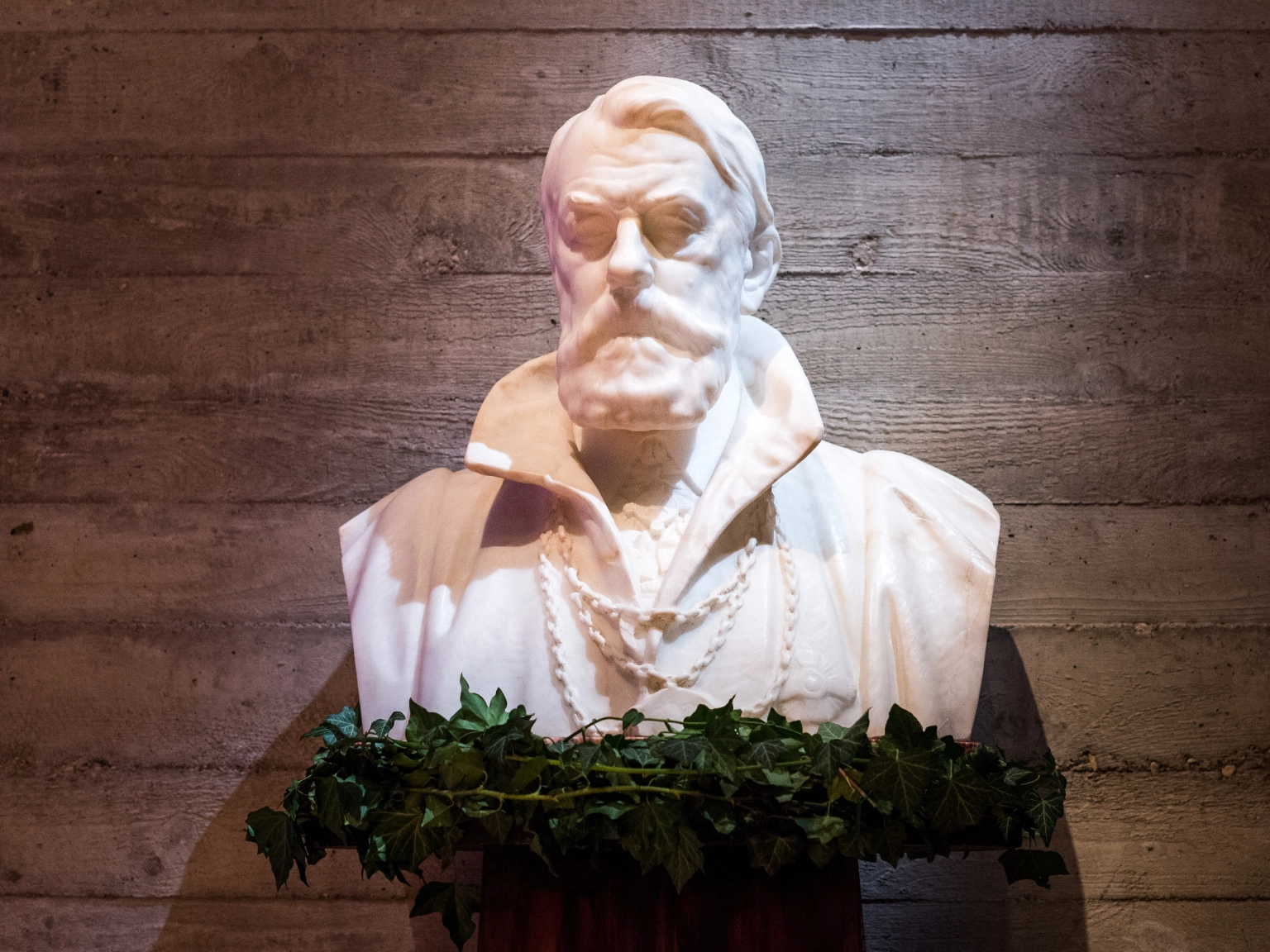
© Stiftung Niedersachsen, Foto: Ole Spata | Porträtbüste Joseph Joachim
Joseph Joachim the competition's namesake
The Stiftung Niedersachsen has honored Joseph Joachim every three years since 1991 with the Joseph Joachim Violin Competition Hanover. Find out more about the great artist, teacher and composer.
Felix Mendelssohn Bartholdy was his mentor and role model
Joseph Joachim was born on June 28, 1831 to a Jewish merchant family in Kittsee near Bratislava. The family moved to Budapest in 1833. As a small child, Joseph Joachim received his first violin lessons from the Polish concertmaster of the Royal Opera in Pest, Stanislaw Serwaczynski. His talent was quickly noticed and his path as a musician was set.
At the age of seven, Joseph Joachim was taken to Vienna for further training, where he was taught by Joseph Böhm. He played in Joseph Hellmesberger's "Children's Quartet", attended the Vienna Conservatory and completed his training at the age of twelve.
Joseph Joachim moved to Leipzig, where Felix Mendelssohn Bartholdy became his mentor and role model. These years in Leipzig shaped Joachim's artistic identity. Mendelssohn ensured that his protégé received a broad general education and composition lessons in addition to his development as a violinist. He took Joachim to London, where he performed Beethoven's Violin Concerto for the first time to great acclaim. Mendelssohn's comprehensive concept of art and artistry, which Joachim also experienced intensively, gave the young violinist and composer a firm orientation in his musical and personal development.
Joseph Joachim was 16 years old when Felix Mendelssohn Bartholdy died suddenly in 1847. The loss of his great role model hit him hard and a time of crisis followed. In 1849, Joseph Joachim went to Weimar, where he met Franz Liszt and Richard Wagner, became concertmaster and also worked as a composer. Here his decision to dedicate himself to Mendelssohn's musical ideal was solidified.
At the age of seven, Joseph Joachim was taken to Vienna for further training, where he was taught by Joseph Böhm. He played in Joseph Hellmesberger's "Children's Quartet", attended the Vienna Conservatory and completed his training at the age of twelve.
Joseph Joachim moved to Leipzig, where Felix Mendelssohn Bartholdy became his mentor and role model. These years in Leipzig shaped Joachim's artistic identity. Mendelssohn ensured that his protégé received a broad general education and composition lessons in addition to his development as a violinist. He took Joachim to London, where he performed Beethoven's Violin Concerto for the first time to great acclaim. Mendelssohn's comprehensive concept of art and artistry, which Joachim also experienced intensively, gave the young violinist and composer a firm orientation in his musical and personal development.
Joseph Joachim was 16 years old when Felix Mendelssohn Bartholdy died suddenly in 1847. The loss of his great role model hit him hard and a time of crisis followed. In 1849, Joseph Joachim went to Weimar, where he met Franz Liszt and Richard Wagner, became concertmaster and also worked as a composer. Here his decision to dedicate himself to Mendelssohn's musical ideal was solidified.
Andreas Moser, Joseph Joachim, 1898, p. 197.
Joseph Joachim's work in Hanover and Berlin
In the fall of 1852, Joseph Joachim made the decision to move to Hanover. He made his home there for 15 years and his work as concertmaster (later concert director), soloist and confidant of King George V had a significant impact on the city's musical life. Joseph Joachim undertook concert tours throughout Europe. He also continued to find time to compose. His years in Hanover are associated with his close friendships with Johannes Brahms and Clara Schumann, his marriage to the singer Amalie Schneeweiss and a musical development that elevated him, in the words of a contemporary critic, "high above the virtuosity of today ... in the service of genuine, true art". He dared to perform Johann Sebastian Bach's solo works for violin in public; he not only played his own compositions, but above all those of contemporary composers (most of whom he was also friends with). Joseph Joachim embodied the "musician above all things", the performer in the service of music.
In 1866, Hanover became Prussian and Joachim left the royal orchestra. Two years later, he accepted an appointment in Berlin as the founding director of the Royal Academic Academy of Performing Arts, later the Academy of Music and today the University of the Arts. There he founded an orchestra and the legendary Joachim Quartet. Joseph Joachim worked as a concert musician and teacher for almost 40 years. He died on August 15, 1907.
The university honored Joseph Joachim with a large memorial service, for which the sculptor Otto Lessing made a portrait bust. In June 1913, a monument to Joachim was unveiled in the foyer of the university's concert hall.
Since 1991, the Stiftung Niedersachsen has honored the artist in a special way every three years by holding the International Joseph Joachim Violin Competition in Hanover.
In 1866, Hanover became Prussian and Joachim left the royal orchestra. Two years later, he accepted an appointment in Berlin as the founding director of the Royal Academic Academy of Performing Arts, later the Academy of Music and today the University of the Arts. There he founded an orchestra and the legendary Joachim Quartet. Joseph Joachim worked as a concert musician and teacher for almost 40 years. He died on August 15, 1907.
The university honored Joseph Joachim with a large memorial service, for which the sculptor Otto Lessing made a portrait bust. In June 1913, a monument to Joachim was unveiled in the foyer of the university's concert hall.
Since 1991, the Stiftung Niedersachsen has honored the artist in a special way every three years by holding the International Joseph Joachim Violin Competition in Hanover.